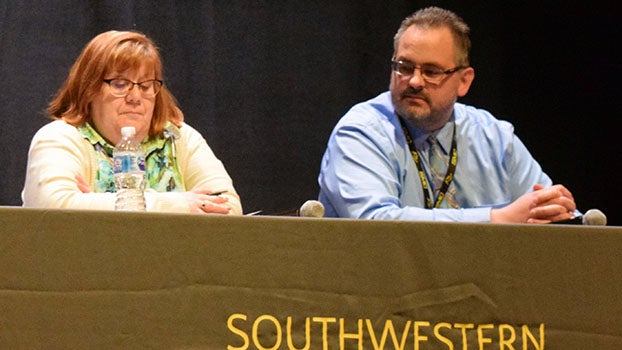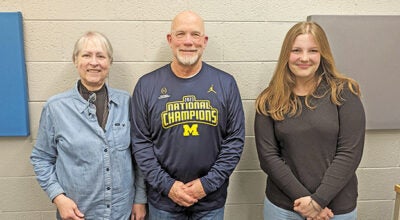SMC panel debates social media’s influence on decency
Published 9:52 am Wednesday, March 20, 2019

- SMC hosted a panel on social media influence March 14. Pictured above are Dr. Mary Young-Marcks and Leon Letter. (Submitted photo)
DOWAGIAC — A Southwestern Michigan College Law Careers Day panel March 14 debated whether social media’s ability to express opinions from a distance diminishes human decency or amplifies pre-existing divisions.
Carol Bealor, president of the Cass County Bar Association, Circuit, Family and Probate courts administrator and SMC business law instructor, moderated the discussion.
Panelists included Cass County Chief Judge Susan Dobrich; Mary LaSata Spiegel, Berrien County Bar Association president and a St. Joseph Legal Aid attorney; SMC communications instructor Cody Miller; social sciences instructor Dr. Mary Young-Marcks; and attorney and business, economics and law instructor Leon Letter.
“We see in the courts that social media like Facebook and Twitter clearly affect human decency,” Dobrich said. “People are more likely to write things than to say things. The First Amendment, which gives the right to free speech, only regulates state action. TV and radio especially are regulated because of licenses they can lose. At some point, we’re going to have to decide if we’re going to allow regulation of private companies such as Facebook to eliminate hate speech. We regulate TV’s private corporations, but not Facebook or Twitter being used as media.”
While visiting her daughter in Boston, Spiegel encountered speaker’s rock in Portland, Maine, where people engage in totally free speech. It reminded her of Nazis marching on Skokie to enrage Holocaust survivors, which triggered counter-protests, when she lived in Chicago. Justice Louis Brandeis said of hate-speech controversies, “The remedy to be applied is more speech,” not enforced silence.
“Should a person speaking online have fewer rights than at the speaker’s stone in Portland? (Electronic) audiences can create so much more damage,” Spiegel said. “Just because we don’t like certain speech doesn’t mean we should regulate it. We don’t use shame enough to maintain societal standards. Who’s human decency do we use? Mine or yours? ‘Free speech’ doesn’t mean you can say anything. There are consequences. If I’m a private employer, I can fire you, even for behavior in your private life. Your right to free speech is only to not get arrested by the government.”
“Social media provides an avenue for dissonance to be created between individuals and groups. That is not to say this dissonance wasn’t already in existence before social media,” Miller said. “I would argue basic human decency and respect for others have long been at risk. It’s simply a new platform providing some anonymity and a layer of distance from consequences. Human decency sticks to us like glue, inherited from those around us and learned from significant others. Human decency grows before we are exposed to social media. Technology is just a tool. Balance has to be achieved by not just looking at regulation, but the micro level where individuals make decisions about morality in the moment. Regulation is an end game which won’t ultimately be successful.”
“We don’t have face-to-face conversations anymore,” Young-Marcks said. “Classroom communication is so different versus online. Students who say absolutely nothing are very different in a discussion realm. Sometimes it’s good because you know students have something to say and they feel comfortable with that distance. Levels of respect change corresponding with emails or tweets. I have to tell students I won’t take emails in ‘text language.’ I like vowels.”
“Journalists should stop tweeting and start reporting again,” Young-Marcks added. “Tweets are instantaneous reaction, before information can be checked or digested. I may not agree with what you say, but I will defend your right to say it. Who decides what the prevailing standards of propriety, morality, modesty and ‘good taste’ are? It’s a slippery slope.”
“I agree the press needs to get off Twitter,” Spiegel said. “My head almost exploded when a reporter posted, ‘Should the press report both sides?’ There aren’t two sides. There’s truth to be determined by investigation. Do your jobs and report that. I guarantee you somebody else will report opposite perspectives. Social media’s rise has led to moral relativism (giving equal weight to all points of view.)”
“Economically, it’s a much simpler issue,” Letter said. “You put money on the table, people rein in behaviors really fast. If the issue is people who abuse social media, start putting liability on the host and they will immediately start monitoring use of their platforms. The First Amendment doesn’t apply to them because they’re not government entities, but they can shut down a lot with their pocketbooks on the line. As a society, we have become accustomed to shock value. If we can get people to react, it eggs us on to do more.”






